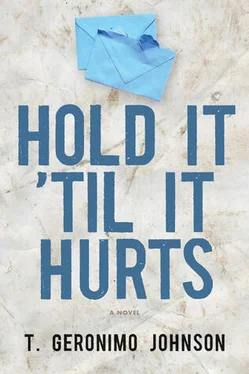“Mr. Conroy, your brother is looking for you,” said Morse, his usually stentorian voice light, somewhat like the saccharine tone intended to lure a dog one was tired of chasing, a dog who thought it all a game.
“Are you still in New Orleans, Mr. Conroy? Your brother Achilles is here too. Mr. Conroy? Troy Conroy?” Morse confirmed the number. He had dialed correctly. Moved by Achilles’s determination, Morse had done a little legwork, put a man on the case who found out that there was an inheritance, and that Troy had called about his.
True, Achilles had occasionally felt an envy that turned his stomach and left a sour taste in his mouth, like the film that remained after tossing a grenade. On rotation he had often wished he was still big enough to kick his younger brother’s ass, especially when Troy sauntered out to the murder pool to mount up like he was riding a bull. In high school, he had rarely delivered messages from all the girls that called after Troy. But wanted to harm him? Never. Or had he?
The thought roused him, frisked him, and he felt exposed, as he had when Wages cinched his wrist in a vise-like grip and barked, “Why the fuck is this watch on Kabul time?” He had the physical sensation again of being shot at as Morse repeated himself.
Simple, old-time police work, Morse called it. And there was Achilles stuttering into the phone that he hadn’t known about any inheritance when he filed the MP report, and he hadn’t claimed to be his brother. The attorney made that mistake, and no, he still hadn’t seen his brother since the day after the funeral. And no, he wasn’t angry about Troy inheriting more money. And yes, the bruises Morse had seen really were from a fight with a stranger. And Morse hmm-hmm-ing and uh-uh-ing, finally saying, “I understand. I believe you, Achilles, but you need to come down so we can talk and update the report.”
Surely Morse was wrong, Achilles protested. He had a text message with eight exclamation points. Achilles had spoken to his mother. She was buying a pool table and planned to build a kennel. She tried to contain herself, but she was happier than he’d ever heard her. “My mother talked to Troy.”
Morse cleared his throat, taking on the avuncular tone he had used when they went to lunch. “Achilles, I spoke with your mother. She didn’t talk to Troy herself. She bumped into the attorney’s receptionist in the parking lot at the dentist’s office.”
Achilles fought the urge to vomit.
“I’m very sorry, Achilles.”
Wages would have tried to fit it all into the new theory of life he’d picked up from the VA nutcrackers he had seen since the Bethany incident. His new vision concerned the Zulus and some kind of warrior purification ritual. Supposedly, until a warrior completed the ritual, he couldn’t reenter society without soiling everything he touched. Achilles had agreed with him at first, desperate to find an order to things, an unfamiliar wistfulness overtaking him as Wages started his story. “Listen up good, Connie, this is like the Bible, but it’s better because it’s true, and it explains the dreams.”
Achilles had listened as attentively as at a briefing but understood nothing, even as he studied the wooden African mask now dominating Wages’s mantel for clues. The ovular brown face with slit eyes and pointy teeth stood over the room like a sullen guard. The hair was brown fur, but the beard was red, made from spent shotgun shell casings. Achilles couldn’t make heads or tales of Wages’s new theory. First, Achilles didn’t dream. Well, he knew he dreamed, but fortunately he remembered nothing, so why did it matter? Second, what did an old African tribe have to do with modern warfare? Third, when he thought about Ines, he considered himself lucky. If he was soiling things, if he hadn’t really reentered society and Ines was punishment, Achilles would die if things got any better. He’d just fucking pop-lock, like the otherwise healthy soldiers who died unexpectedly in combat, usually of sudden heart attacks. He had blown Wages off, but as he dialed his mother’s number, he suddenly wasn’t so sure.
Like that old song said, “ Getting shot at wasn’t too bad, it was getting shot that shook you up. ” If talking to Morse was being shot at, talking to his mother was being shot. In the few days since announcing Troy’s imminent return, she had accepted it and the joy was apparent in her voice, turning his belly cold and his tongue stony. His heart beat in his chest like a dying fish as he hastened to speak, to assure her he was there, he could hear her. He pictured her at her desk before remembering that she forwarded the house phone to her cell and could be anywhere.
“Are you at the house?”
“No.”
“Where are you? Are you on the way back yet?” she asked.
“Almost.”
“Almost here? Or almost on the way? Keelies? He’ll be here any minute.”
“Did you actually talk to him?”
The connection was poor. Or was it his hearing? “No, but … You see … Perfect isn’t it … That’s how I know he got your message. Achilles are you there?” He assures her he is still there, that it’s great, it’s wonderful, it’s stupendous, it’s terrific to hear that Troy called Chuck Riley over in Mercersburg about his inheritance. Yes, he agrees, it’s miraculous, there is a God, but … “Mom! Did you actually talk to him?”
“No.”
“Oh Mom.”
“I saw Lisa, Chuck’s receptionist.”
“Why didn’t you … Why did …”
“I was excited, and I didn’t want you to think he only cared about the money.”
This was a point that, embarrassingly enough, he had considered. He explained how the attorney had mistaken him for Troy, but she argued. “It’s not like Chuck doesn’t know Troy’s voice,” she said. “It’s not like you wouldn’t clear that up. Right? So you better get oscar on the mike or whatever you call it over there, because he’ll be here any minute now.”
It was one of the first times he understood how some guys could take off running across the desert, gulp a grip of Tylenol, bite a barrel. Maybe Wexler had known it was a minefield.
He liked to think of himself as an honest guy, but he was starting to think he’d never really told the truth when it mattered. When Lamont Jackson caught shrapnel that sheared off the back of his helmet and head cleanlike, easy as scooping ice cream, and his brains looked like, well, a pickled walnut, he asked Achilles if he was going to make it, and Achilles was so transfixed by the sight of the open skull, so certain he was cursed to see this side of a friend, he couldn’t answer. He tried nodding. Everyone was talking and yelling and screaming, but they couldn’t hear shit, and neither could Achilles. Jackson was mouthing the words. All Achilles had to do was mouth the words Yes, you’ll make it. He couldn’t. He half-nodded. But Jackson had that look in his eye like he knew Achilles was lying, and, worse yet, he forgave him for it. That was the real burn, that a dying man held forth grace for Achilles, the living, who hadn’t the courage to be forthright and tell him, “Yes, say your prayers or meditate, or think of your mom, or conjure the memory you want to take home with you, because you sure don’t want it to be Sergeant Achilles Holden Conroy fly-eyed and crying and sweating on you, about to shit his own pants, you sure don’t want it to be the crumbled remains of the bombed nursery we crossed yesterday, each brick a tiny headstone, you sure don’t want it to be the sound of men crying and running scattershot in the dark, screaming for their mommas — and not like babies, but like only men can scream — and you sure don’t want it to be the decapitated Muslims killed by other Muslims and left on the side of the road, because the townspeople who move to bury the dead are judged coconspirators and dispatched to join them, because to attend to them is to sympathize, to confer dignity is to abet, because compassion is outlawed, and you don’t want it to be Lionel Dinkins, who took the brunt of the blast — acrid, pungent, something you should never smell — and you don’t want it to be the way the sand under your back is hot, so hot it’s like it’s baking you through the flak jacket, or the corn that suddenly aches like a scorpion stung your toe because of how your boots pinch at the end of the day because your feet have swollen to what seems like twice their normal size, and it can’t be the swishing of your pants as your legs twitch because that’s too much like running, which you’ll never do again, and you don’t want it to be the sound of your feet flopping in the sand, it’s too much like the sound of sifting, and you’ll wonder what’s being left behind, and you don’t want it to be the sound of your own tears, with your heart beating too loudly in your ears and your sobs echoing in your chest, because you never rest well when you cry yourself to sleep.”
Читать дальше












